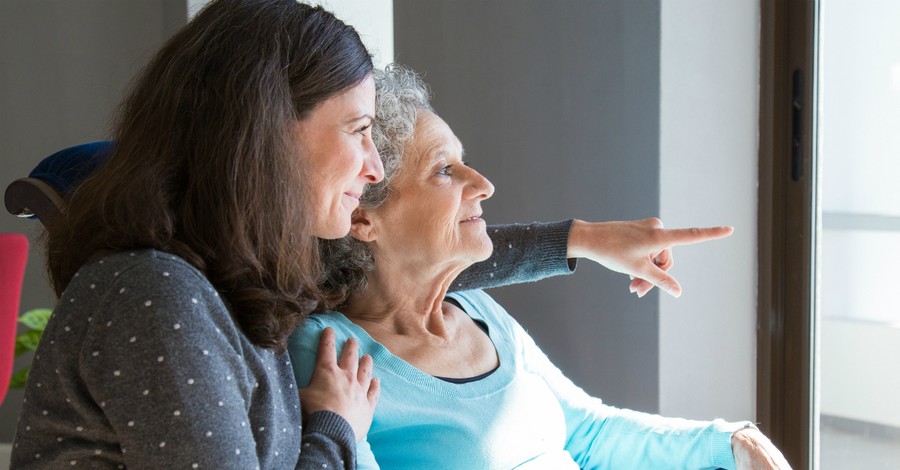
Loving a mother is forever, from the first moment you become aware of her presence to the last breath you yourself take on this planet. The most difficult time to love her is, of course, at the time of her demise and death. As Queen Elizabeth so poignantly reminded us at the death of her husband Prince Philip, grief is the price we pay for love. After grieving your mother’s death, your love for her will linger until the day you take your own last breath.
Honoring your mother while she is alive and vibrant, providing thoughtful gifts, phone calls, shared meals, and loving cards, is important. Honoring her by caring for her as she ages is also an important season when you can reciprocate the kind of love and care she once gave to you. However, loving an aging mother who is increasingly debilitated brings an entirely new season of life, one marked by anxiety and guilt. None of us want to see our mother pass away, but we also do not want to see the person we love struggle and suffer.
My friend Paul was recently in this awful, heartbreaking place. I’m a doctor of the terminally ill, as well as a daughter, a mother, and a grandmother. I could see that Paul needed help. What I said to him might help you as well if this Mother’s Day finds you struggling with negative emotions even as you care for and love an aging mother.
Paul had moved his 88-year-old mother near him so he could watch over her. By that time, she was battling dementia. Dementia patients typically experience a gradual decline for several years, followed by a sudden, precipitous drop in mental function and physical ability. This abrupt change often leads to panic in those who love them. This was the situation in which Paul found himself. Having his mom in a house next door had been a great arrangement for a while. He was able to keep a close eye on her and her beloved Chihuahua and offer regular help. But then her dementia began progressing quickly. She lost control of bodily functions and experienced multiple episodes of delirium. She had to be hospitalized several times for urinary tract infections.
Paul and his wife suddenly found themselves on the caregiving roller coaster. Each day was draining mentally, physically, and emotionally. Still, they were determined to keep Paul’s mom at home because he had promised that he’d take care of her. With each visit to the ER and each hospital stay, she would show slight, temporary improvement, but never to the point of her previous baseline, which was poor to begin with. With each round, she deteriorated more.
Paul was exhausted and unsure of what to do next. He told me he was aware that she would have hated to know the condition she was in. He also knew that he would never want this for his children. Still, his emotions ran high because he wanted desperately to keep his promise to care for her until her death.
I recognized in Paul the common inner turmoil that family members face when they find themselves in this place of helplessness and guilt. The guilt can stem from many things. It can originate in the thought that I should have prepared better for such a time as this.
Or, guilt can arise from thoughts such as My mom would be better off if she could simply pass peacefully and be done with all this suffering.
In Paul’s situation, treating his mother with antibiotics to battle a recurring infection was not going to reverse the outcome of the bigger war against dementia. Things would continue to go from bad to worse, producing increasing daily suffering for all concerned. This was why Paul struggled. No child would want to make the decision to withhold bacteria-fighting antibiotics and hasten the end of your own mother’s life. At least, not unless your mother had specified in an Advanced Care Planning directive that such treatment be given only when it extended her life with a quality of life that she would desire.
I listened for a long time as Paul poured out his troubles to me. As a daughter, I understood and felt his deep suffering. As a doctor, I replied.
“You are a good son,” I said. “It’s time to get hospice involved and let them help you with these hard decisions. Sometimes the best decision is not to keep fighting in vain for life but to focus on dying well. It is that time for your mom.”
Is that the way to love a mother to death? Yes, it is. A loving child makes death more bearable for a mother. Being a good child of the elderly is all about making hard decisions. Loving an aging mother to death involves getting professional help to give her life quality and meaning until the day of her death. Just as you slowly recognized as a baby that it was a mother who was holding you and giving you sustenance, for many of us, it’s a slow path to recognizing that our mother is no longer there. Love your mother well when she is alive. And love your mother to death.
The views expressed in this commentary do not necessarily reflect those of Christian Headlines.
Photo courtesy: ©GettyImages/MangoStarStudio
Dr. Pamela Prince Pyle is a Board-Certified Internal Medicine physician who studied at Oklahoma State University, North Texas Health Science Center, and completed her training at Baylor University in Houston. She was one of three physicians selected in 1992 by Carolina Health Specialists (CHS) to begin the first hospital-based internal medicine practice outside of a university setting in the United States.
Dr. Pyle has proudly served her community by volunteering at Friendship Medical Clinic which provides free medical care for those without insurance or access to care.
In 2009 Dr. Pyle began traveling to Rwanda for medical work with Africa New Life Ministries (ANLM). She was instrumental in the founding and growth of the Dream Medical Center (DMC) in Kigali. The Dream Medical Center is a state-of-the-art hospital and the second-largest private hospital in Rwanda currently in the process of earning international accreditation. Additionally, with her husband Scott, Dr. Pyle founded the charity 2 Live Beyond which raises support for charities serving children in South Carolina and in Rwanda.
Nationally, she serves in Washington D.C. as a Museum of the Bible Women of Legacy Ambassador. She is the author of A Good Death: Learning to Live Like You Were Dying, coming in 2023.










